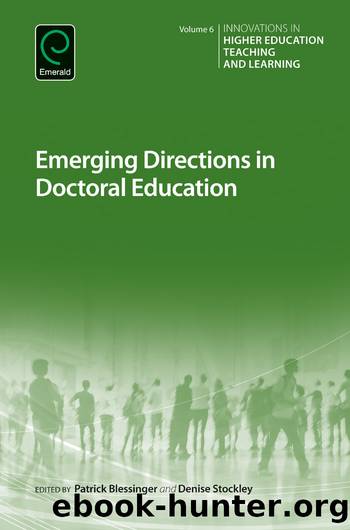Emerging Directions in Doctoral Education by Blessinger Patrick;Stockley Denise;

Author:Blessinger, Patrick;Stockley, Denise;
Language: eng
Format: epub
Publisher: Emerald Publishing Limited
Published: 2016-03-28T00:00:00+00:00
Table 3.âDifferences in the Research and Supervision Stage.
THE FINAL STAGE: EXAMINATION AND AWARD
Perhaps not surprisingly, the most complicated issues to be negotiated arose around the format and rules of the final examination and the award. According to the initial Memorandum of Understanding, the Joint PhD degree should be awarded by a single procedure and a single examination at the home university, which is documented at both universities in accordance to their respective rules. There were no doubts about the equivalence of both procedures, but there were rules within the participating faculties âPromotionsordnungenâ (PhD regulations) at Humboldt-Universität and within the Kingâs College âCore Code of Practice for Research Degreesâ (2014b) that seemed to exclude each other.
In UK doctoral training, supervision and examination are strictly separated (QAA, 2004, p. 24). This means that the dissertation, when supervisors agree it to be ready for review, is reviewed by two examiners that have had no professional connection with the candidate. The final oral exam (viva) is rather confidential in character, held by the reviewers and excludes the public; supervisors may be present at the studentsâ discretion, but are not allowed to interfere. The viva can be an in-depth discussion of the dissertation, resulting in a pass/fail decision and recommendations of which parts of the dissertation need major/minor revision, for which a maximum period of 18 months are allowed. When the recommendations or conditions set out in the examinerâs report have been met, the revised thesis is submitted. To ensure public access, one hard-bound copy of the thesis will usually be displayed in the universityâs library. Since 2012, KCL also operates an electronic repository for doctoral theses. The degree is formally awarded at the summer or winter graduation ceremony. Successful candidates can use the title of PhD only after the award has been made and they have received their certificate.
In Germany, by contrast, one review of the dissertation is written by the supervisor, who has intimate knowledge not only of the product, but also of the process leading to it. A second reviewer is appointed to establish an independent view on the piece, and the dissertation and its reviews are displayed to the access of the faculty, representing the quality assurance through the scientific community. Usually both reviewers are part of the examination board which is set up specifically for each PhDâs disputation, but comprising (depending on the departmentâs regulation) several other examiners, in some cases also representatives of the non-professorial staff. The disputation is a public form of examination and usually opens for questions from the audience, again at least theoretically integrating the scientific community. A further difference is that both the written thesis and the result of the disputation are graded, with grades covering five brackets from ânon sufficitâ (fail) to âsumma cum laudeâ (with distinction). The title, however, cannot be awarded to the candidates until the thesis has been formally published. This can take up to two years after the disputation, depending on the extent of the revisions required by the examiners and â particularly in the humanities â the candidateâs choice of publisher.
Download
This site does not store any files on its server. We only index and link to content provided by other sites. Please contact the content providers to delete copyright contents if any and email us, we'll remove relevant links or contents immediately.
The Art of Coaching Workbook by Elena Aguilar(51199)
Trainspotting by Irvine Welsh(21667)
The Secret History by Donna Tartt(19090)
Twilight of the Idols With the Antichrist and Ecce Homo by Friedrich Nietzsche(18634)
All the Missing Girls by Megan Miranda(16029)
Cat's cradle by Kurt Vonnegut(15357)
Ready Player One by Cline Ernest(14676)
Talking to Strangers by Malcolm Gladwell(13370)
Fangirl by Rainbow Rowell(9251)
The remains of the day by Kazuo Ishiguro(9000)
The Compound Effect by Darren Hardy(8969)
Thirteen Reasons Why by Jay Asher(8912)
Tools of Titans by Timothy Ferriss(8396)
Periodization Training for Sports by Tudor Bompa(8273)
Wonder by R. J. Palacio(8110)
The Lover by Duras Marguerite(7903)
A Court of Wings and Ruin by Sarah J. Maas(7847)
Change Your Questions, Change Your Life by Marilee Adams(7783)
The Complete Stick Figure Physics Tutorials by Allen Sarah(7373)
